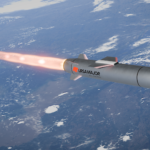
The Defense Department on Thursday announced its first round of awards in fiscal year 2024 under its program to quickly transition technologies—most of which are being developed by small businesses and non-traditional defense contractors—into production. The four awards include $14.4 million for the Navy’s Electronic Intelligence Modernization Upgrade (EIMU), $13.6 million for the Air Force’s ARCHER Airborne Threat Detection and Tracking, the Marine Corps’ Accelerated Procurement of Maritime Expeditionary Standoff Response Advanced Capability Modules (AMPAC), and $10.1 million for the…

 By
By 










